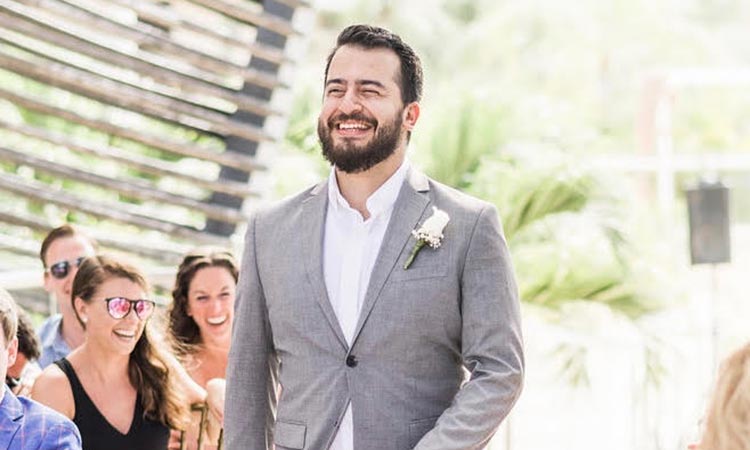The Miraculous COVID Journey of Francis Wilson ’20

When Francis Wilson began to feel ill, he dismissed the tickle in his throat as seasonal allergies. It was March 10th, three days after Virginia and the District announced their first confirmed cases of coronavirus. The 29-year-old student, only a few months away from graduation from Antonin Scalia Law School, saw no cause for concern. Even as his symptoms worsened, Wilson experienced no respiratory distress until the evening of the 15th, when he noticed a tightness in his chest. The next day, he headed to Urgent Care, where he was tested for both the flu and COVID-19. The flu test was negative, and he left the Urgent Care with migraine medicine. The positive result for the COVID-19 test wouldn’t come back until Wilson had already checked into Virginia Hospital Center, unable to stand without gasping for breath, so overcome with fatigue that a trip from his bed to the bathroom took nearly an hour.
The same day that Wilson arrived at the hospital via ambulance, he was transferred to the ICU. There, a doctor recommended that Wilson be placed on a ventilator, which would mechanically push air through his lungs and require a medically induced coma. Wilson only had twenty minutes to prepare. His brain organized itself around logistics, and he hurried to make arrangements. Wilson emailed his professors at GMU and contacted his ex-girlfriend to ask her to care for his pet snake and hedgehog. He says he didn’t realize what a drastic measure being put on a ventilator was. “Frankly,” said Wilson, “I was more scared about the prospect of being under, rather than the prospect of potentially dying.” Yet once he was under, he came face-to-face with death. The sensations experienced during his coma felt unlike a dream and were laced with real-world stimuli. He could hear the voices of his family calling out to him. He remembers being in a hospital bed as he was rushed down a hallway. Unable to breathe, and soaked with sweat, he could see the light fixtures passing over his head. He could hear nurses— who, lacking access to proper PPE, donned garbage bags— discussing his condition. “That is a memory as opposed to a dream,” says Wilson. “That is something that I lived.”
His unconscious mind transported him to Wuhan, China. On the second evening of his stay, Wilson and a date attended a black-tie gala on the roof of his hotel. While being transferred to George Washington University Hospital, Wilson believed that he was dead and being processed for burial. “I've come to grips with the fact that what I experienced wasn’t real in that sense,” says Wilson. “But moving forward my approach is that I have experienced the sensation of dying. I have experienced the sensation of resigning to the fact that I would never be able to speak to my loved ones again. Thinking about what my funeral would look like.”
Nine days after he was sedated, Wilson regained consciousness. Following his discharge, he attempted to contextualize his experience and to confirm the sensory details he remembered. He vowed to not let things go unsaid to his loved ones and grappled with the fact that he thought he’d died with unfinished business. He says when he believed he was dead, he felt frustrated that he hadn’t achieved his goal of graduating from law school.
GMU, says Wilson, supported him throughout the ordeal and was immensely helpful in allowing him to get caught up. “He really amazed me,” says Christine Malone, Assistant Dean of Student Affairs, who worked with Wilson and faculty to set up an alternate schedule for coursework and exams. “It’s a real testament to his drive and dedication.” She says Wilson could have opted to take a few classes off his plate and aim for a July or December graduation date, but that it was clear that Wilson was determined to meet his goal. Both Wilson and Malone say that it was a group effort, that his professors and administrative deans went above and beyond to support him. Wilson graduated from Antonin Scalia Law School in May 2020.
Wilson is still processing how this trauma has affected his life, both physically and mentally. He still struggles with shortness of breath and fatigue. And he doesn’t yet know the extent of the damage to his lungs and heart. Wilson is dealing with these residual effects at a time when COVID-19 cases in the U.S are spiking. He feels a responsibility to tell his story and to combat misinformation. “While I may just be a number,” says Wilson, “each of those numbers has a story… And unfortunately, there are two hundred thousand people unable to tell their stories today.”